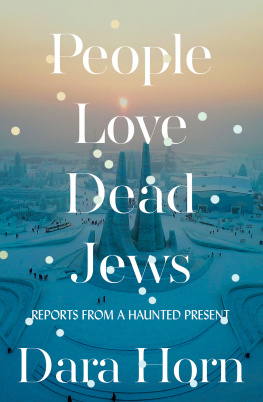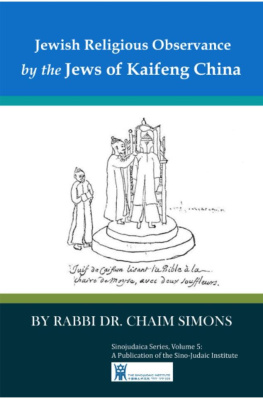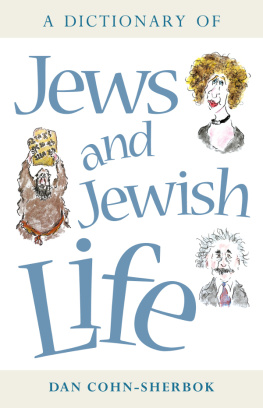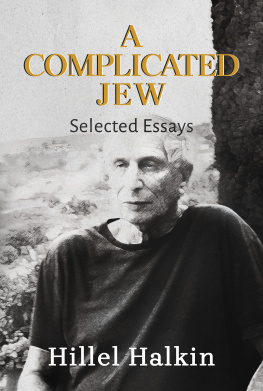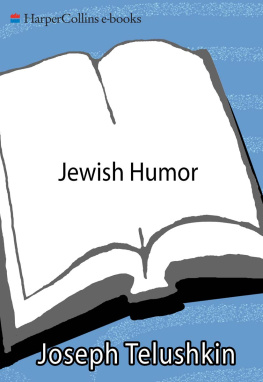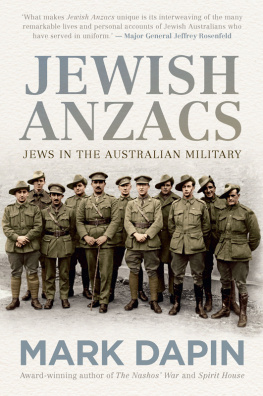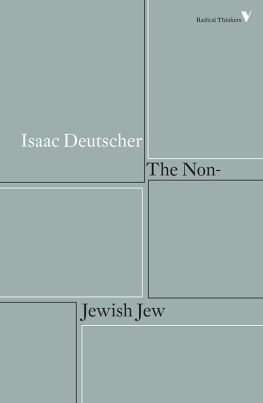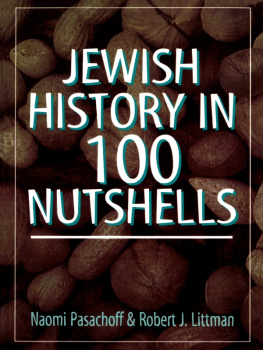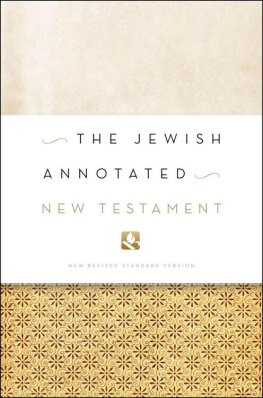
PEOPLE
LOVE
DEAD
JEWS
Reports from a Haunted Present
DARA HORN

W.W. NORTON & COMPANY
Independent Publishers Since 1923
For Maya, Ari, Eli, and Ronen,
who know how to live
SOMETIMES YOUR BODY IS SOMEONE ELSES HAUNTED house. Other people look at you and can only see the dead.
I first discovered this at the age of seventeen in the most trivial of moments, at an academic quiz bowl tournament in Nashville, Tennesseewhere, as the only girl from my New Jersey high school, I shared a hotel room with two girls from Mississippi. We were strangers and competitors pretending to be friends. One night we stayed up late chatting about our favorite childhood TV shows, about how we had each believed that Mr. Rogers was personally addressing us through the screen. We laughed together until one girl said, Its like Jesus. Even if he didnt know my name when he was dying on the cross, I still know he loved me, and if he knew my name, he would have loved me too. The other girl squealed, I know, right? Its just like Jesus! Then the two of them, full of messianic joy, looked at me.
I said nothinga very loud nothing. The girls waited, uncomfortable, until one braved the silence. It seems like people up north are much less religious, she tried. How often do you go to church?
It so happened that I was very religious. My family attended synagogue services weekly, or even more often than that; my parents were volunteer lay leaders in our congregation, and I had a job chanting publicly from the Torah scroll for the childrens congregation every Saturday morning, which effectively meant that I knew large swaths of the Five Books of Moses in the original Hebrew by heart. On Sundays, I spent four hours learning ancient Jewish legal texts at a program for teenagers at a rabbinical school in New York, and from eight to ten p.m. every Tuesday and Thursday, I studied Hebrew language in a local adult-education class. My public school closed for Rosh Hashanah and Yom Kippur, but my siblings and I also skipped school for holidays like Sukkot, Simchat Torah, Passover, and Shavuot. I read works of Jewish philosophy for fun, tracking medieval and modern arguments about the nature of God. I often privately began and ended my days with traditional Hebrew prayers.
All of this and more required an enormous amount of countercultural effort, education, and commitment on the part of my family that vastly exceeded merely going to church. But I sensed that thisthis being the central pillar of my experience as a human beingwas irrelevant to the question these girls were asking me. I mumbled something about a synagogue and tried to think of a way to steer us back to Mr. Rogers. But now the girls were staring at me, gaping in disbelief.
You, one of the girls stammered, youyou have blond hair!
The second girl inspected me, squinting at my face in a way that made me wonder if I had acne. And what color are your eyes?
Blue, I said.
The first girl said, I thought Hitler said you all were dark.
In retrospect I can imagine many ways I might have felt about this statement, but at the time I was only baffled. I pictured my hand on the quiz-bowl buzzer Id been pounding all week, and provided the correct answer: Hitler was full of shit.
After a pause that lasted an eternity, one girl meekly offered, I guess youre kind of right. Kind of. The other girl doubled down, demanding an explanation for my eye color if I were from the Middle East. But I was done being nice, if being nice meant defending my own face. I left the room, confused.
That night I blurted to my mother from a hotel pay phone, I dont get it. These girls made it to the nationals. These are the smart people! And theyre getting their information from Hitler?
My mother sighed, a long, tired sigh. I know, she said, without elaborating. I know.
My mother was the age then that I am now. And now I know too.
Those girls were not stupid, and probably not even bigoted. But in their entirely typical and well-intentioned education, they had learned about Jews mainly because people had killed Jews. Like most people in the world, they had only encountered dead Jews: people whose sole attribute was that they had been murdered, and whose murders served a clear purpose, which was to teach us something. Jews were people who, for moral and educational purposes, were supposed to be dead.
It took me many years to understand that those girls were not entirely wrong to look at me and think only of a terrifying past. I often felt haunted too.
When I was a child, I had a question that burned within me, and Judaism seemed to answer it. My question was about the nature of time.
I was obsessed with the unspoken and unnerving problem of being trapped in an eternal and inescapable present. As I got into bed each night, I would lie in the dark and wonder: This day that just ended is gone now. Where did it go? If I were a character in one of my novels, I would give the character a motivation for that constant longing. But I am not a fictional character. I had few words then for this deep sense of loss, nor any clear reason for it, other than that my mother came from a long line of women who had all died young, and her mourning for her own mother was something I observed and absorbed, without knowing what she or I was missing. The secondary nature of this grief only underscored the inexpressible feeling I had of arriving too late. With nothing to mourn, I nonetheless felt as though something were constantly flowing out of my life, just beneath its relentlessly cheerful surface. When I began writing as a child, my driving force was not the urge to invent stories but the urge to stop time, to preserve those disappearing days. I kept journals that were more like reporters notebooks, taking minutes on even the most boring events for no reason other than to lock them down on paper. It did not occur to me that most people were not concerned with this problem. It did not occur to me because in my familys religious practice, I found many thousands of years worth of people who shared my obsession with this problemand who had, to my childs mind, succeeded in solving it.
One of Americas many foundational legends is that it doesnt matter who your parents are, or who their parents were, or where you came fromthat what matters is what you do now with the opportunities this country presents to you, and this is what we call the American dream. The fact that this legend is largely untrue does not detract from its power; legends are not reports on reality but expressions of a cultures values and aspirations. Judaism, too, has many foundational legends, and all of them express exactly the opposite of this idea. Ancient rabbinic tradition insists that it was not merely our ancestors who were liberated from Egyptian slavery, but that we ourselves were also personally freed by God. When God gave the Israelites the laws of the Torah at Mount Sinai, this tradition teaches, it was not merely that generation of Israelites who were present, but all of their future descendantsboth biological and spiritualstood with them at Sinai. In America, time was supposed to be a straight line where only the future mattered; in Judaism, it was more like a spiral of a spiral, a tangled old telephone cord in which the future was the present, which was essentially the past.
This profound difference between these two sides of my identity was not abstract or subtle; it was obvious even to a child. In public school, my classmates and I pledged allegiance to the flag and aspired to form a more perfect union, fully invested in Americas future. But when we learned about the pastPilgrims and Native Americans, Patriots and Tories, Yankees and Rebelsthere was no we. In Hebrew school and in the traditional texts I read in synagogue and at home, it was just the opposite. The Hebrew Bible was never discussed in historical context, because we were the historical context. It was our present, and in my familys religious life, it was treated that way. The creation of the world recurred every week at our Sabbath table, where we chanted Hebrew biblical passages about God resting on the seventh day and sang long medieval Hebrew poems about divine creativity in multipart harmony. On Passover, we ate the same matzah wed been eating for millennia, still unable to find the time to let our bread rise during our flight to freedom. Every New Year, Abraham once more drew his knife to his son Isaacs throat, holding our future hostage, fate and free will bound together in a double helix that caught us in its grip.
Next page
